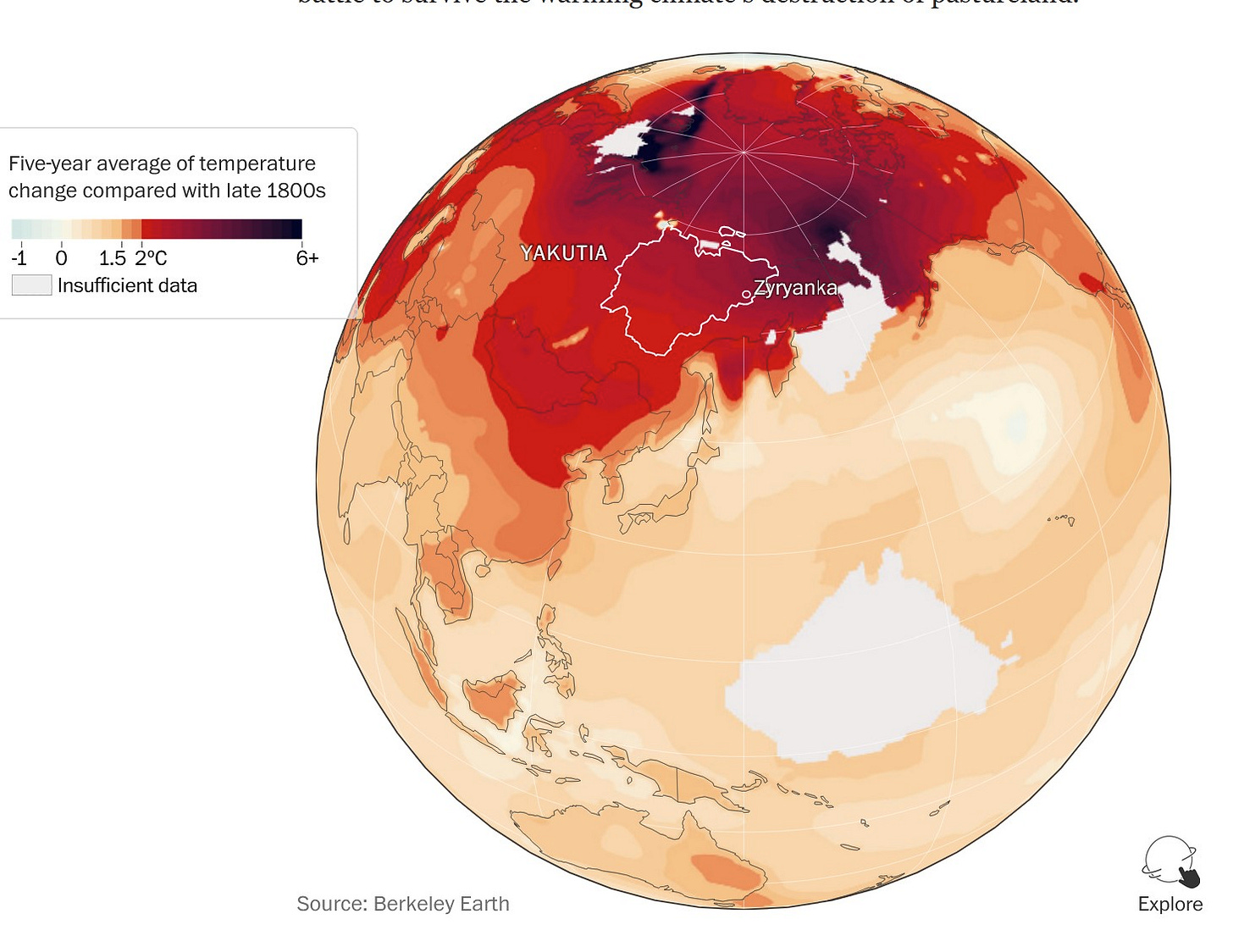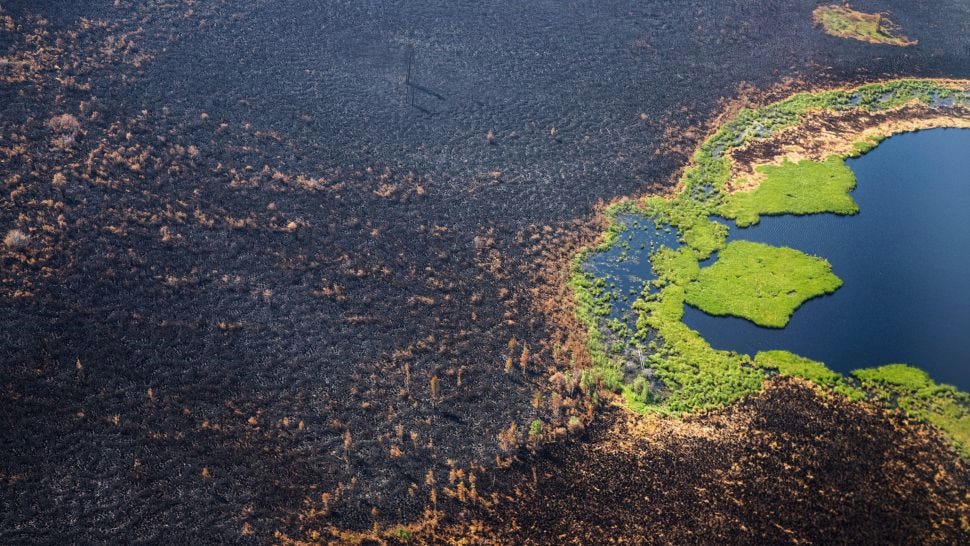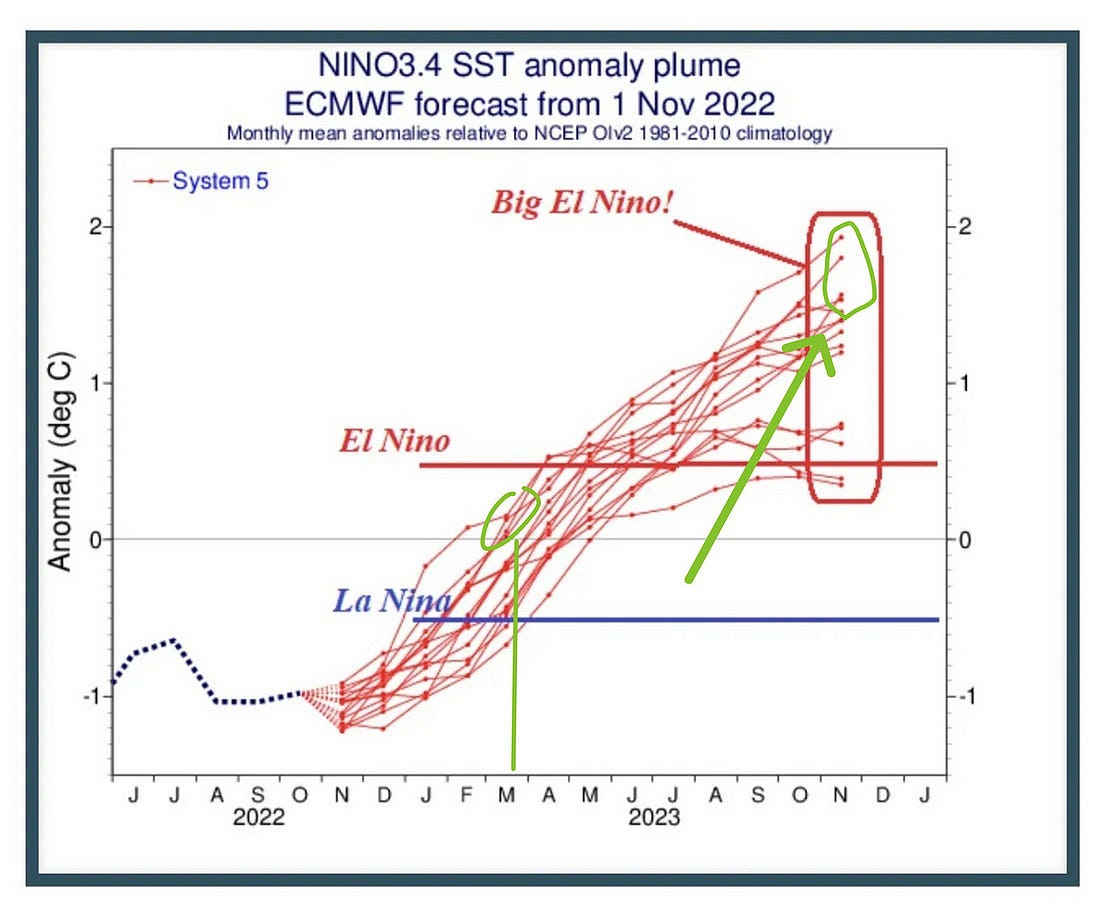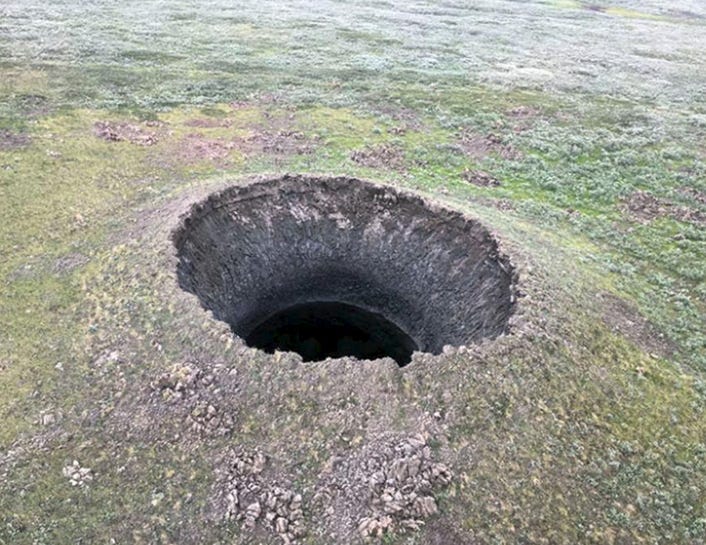The Crisis Report - 31
If you suggest that the war in Ukraine is related to Climate Change, people tell you Putin doesn’t care about “Climate Change”.
People are idiots.
You can show them a map making clear what “Global Warming” means in the physical world.
You can tell them that the Arctic is warming faster than the rest of the planet.
The Arctic has warmed nearly four times faster than the globe since 1979
Communications Earth & Environment volume 3, Article number: 168 Aug 2022.
“In recent decades, the warming in the Arctic has been much faster than in the rest of the world, a phenomenon known as Arctic amplification. Numerous studies report that the Arctic is warming either twice, more than twice, or even three times as fast as the globe on average.”
Here we show, by using several observational datasets which cover the Arctic region.
That during the last 43 years the Arctic has been warming nearly four times faster than the globe, which is a higher ratio than generally reported in literature.
“We compared the observed Arctic amplification ratio with the ratio simulated by state-of-the-art climate models, and found that the observed four-fold warming ratio over 1979–2021 is an extremely rare occasion in the climate model simulations. The observed and simulated amplification ratios are more consistent with each other if calculated over a longer period; however the comparison is obscured by observational uncertainties before 1979.”
Our results indicate that the recent four-fold Arctic warming ratio is either an extremely unlikely event, or the climate models systematically tend to underestimate the amplification.
You can list some of the ways Global Warming is affecting Russia.
Wildfires in Siberia
Recent summers in eastern Siberia have been marked by particularly extreme temperatures — as much as 38 degrees Celsius, or 100 degrees Fahrenheit.
Fires in Siberia kill at least 10 as ‘violent winds’ fan flames May 2022
Current Siberian heating is unprecedented during the past seven millennia Aug 2022
Siberia’s massive wildfires are unlocking extreme carbon pollution
Siberian wildfires dwarf all others on Earth combined: Smoke just reached the North Pole in a first. Aug 2021
Note: This is known as “ecosystem turnover”. All of the trees in the Northern Boreal forests are going to burn in the coming years. Including Alaska and Canada.
A Warming Siberia, Wracked by Wildfires, Nears a Crucial Threshold Nov 2022
Nearly 23 million acres burned from 1982 to 2020. But almost half of that occurred in 2019 and 2020, and the region may be near a threshold beyond which extreme fires become more common.
After 2022’s devastating heat waves and wildfires, scientists warn of even hotter year Jan 2023
Mercury soared above 40C across many parts of Europe in 2022, leading to many deadly wildfires and heat-related deaths.
This year will be warmer than last year, and one of the hottest on record, Britain’s Meteorological Office has forecast. Predictions suggest it will be the 10th year in a row the global temperature is at least 1C above average.
In January 2023.
The warmest January day ever was recorded in at least eight European countries, including Poland, Denmark, the Czech Republic, the Netherlands, Belarus, Lithuania, and Latvia.
In Korbielow, Poland, the temperature hit 19C (66F) – a temperature the village is more used to in May and 18 degrees above the annual average for January. In other parts of the continent, local records were broken at thousands of measuring stations.
Bilbao, Spain, which lost thousands of hectares to wildfires last summer, recorded a temperature of 25.1C (77F) in the first week of January, more than 10 degrees above average.
Melting Permafrost
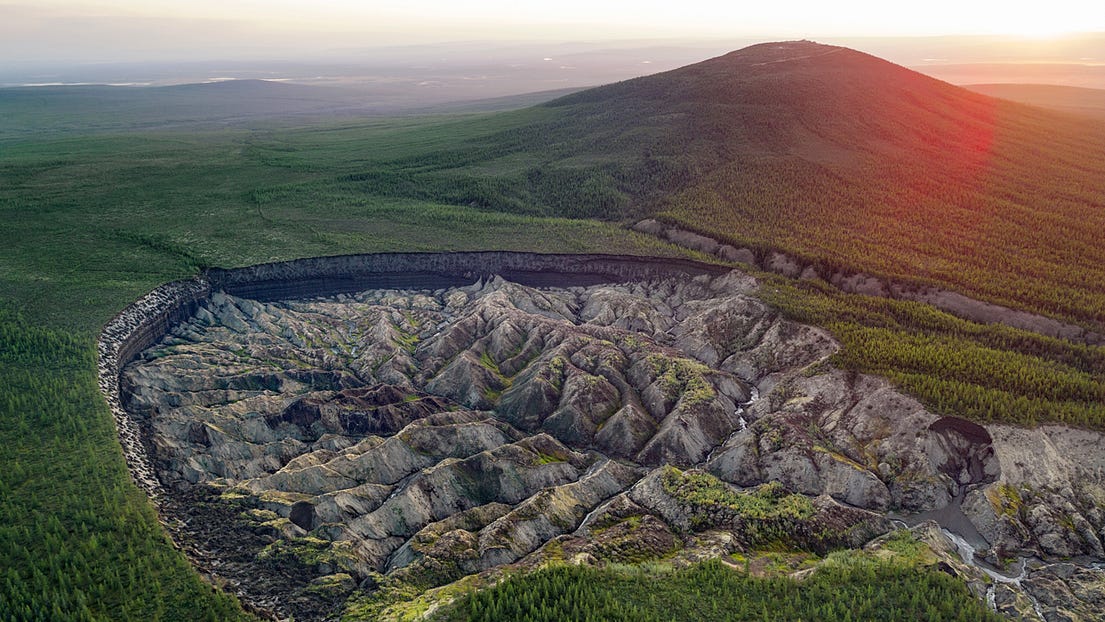
A theoretical study published in 2011 “Agroclimatic potential across central Siberia in an altered twenty-first century” has been used as “proof” that vast new farmlands will become available due to Global Warming. The studies authors stated.
“From 50 to 85% of central Siberia is predicted to be climatically suitable for agriculture by the end of the century, and only soil potential would limit crop advance and expansion to the north. Crop production could increase twofold. Traditional Siberian crops could gradually shift as far as 500 km northwards (about 50–70 km/decade) within suitable soil conditions”.
CARs (Climate Action Resistors) refer to it all the time.
With a couple degrees of warming vast areas of Siberia and Canada will expand arable land to a great degree and the melting glaciers will supply plenty of clean water. The increased CO2 in the atmosphere will improve most crop yields (only maize is unlikely to increase, but its water consumption will fall). The only threat to food supplies is the elimination of natural gas needed to produce fertilizer and diesel to run the agricultural equipment.
The Co-chief investment officer of Value Partners Group has predicted:
“All these vast lands [Russia has] in Siberia will be the biggest, most productive farmlands in the world in the next three decades. They will be a food superpower”
The “On the Ground” reality suggests that the authors of the 2010 study were optimistic.

Siberia’s permafrost melt is causing swamps, lakes, making land difficult to live on: The land affected becomes largely useless for agriculture and infrastructure. Oct. 2021
Melting permafrost in Siberia could dramatically change landscape Sept 2021
“The damage done by melting permafrost will be extremely costly for Russia, with an estimate putting the bill at €58 billion by 2050.”
Radical warming in Siberia leaves millions on unstable ground Oct 2019
“The permafrost that once sustained farming — and upon which villages and cities are built — is in the midst of a great thaw, blanketing the region with swamps, lakes and odd bubbles of earth that render the land virtually useless.”
“The warming got in the way of our good life,” said Alexander Fedorov, deputy director of the Melnikov Permafrost Institute in the regional capital of Yakutsk. “With every year, things are getting worse and worse.”
Extremes of summer climate trigger thousands of thermokarst landslides in a High Arctic environment
“Retrogressive thaw slumps (RTS) – landslides caused by the melt of ground ice in permafrost – have become more common in the Arctic, but the timing of this recent increase and its links to climate have not been fully established. Here we annually resolve RTS formation and longevity for Banks Island, Canada (70,000 km2) using the Google Earth Engine Timelapse dataset.”
We describe a 60-fold increase in numbers between 1984 and 2015 as more than 4000 RTS were initiated, primarily following four particularly warm summers.
Modelled RTS initiation rates increased by an order of magnitude between 1906–1985 and 2006–2015, and are projected under RCP4.5 to rise to >10,000 decade−1 after 2075.
“These results provide additional evidence that ice-rich continuous permafrost terrain can be highly vulnerable to changing summer climate.”
Fantasy Acres: Will Climate Change Actually Create More Northern Farmland? March 2023
“Most of Russia’s existing wheat belt is in the forest-steppe zone, a transitional ecosystem between central Asia’s vast grasslands and the great forests of the north. The forest-steppe zone, however, is drying out. In some regions, drought has led to 70% of their steppe zones becoming unviable for farming.
Just as temperate zones are expected to creep north, so are the (increasingly) dry, harsh conditions of the steppe, consuming the farms that currently exist — and making land eyed for new farms even more precarious. Even studies that expect massive potential for far northern agriculture admit that the existing farms to the south will collapse without irrigation.”
Why Russia’s thawing permafrost is a global problem Jan 2022
“While climate policy may be a way to challenge Russia in the future, climate change is threatening that country now. That's especially true of its permafrost, that soil that remains frozen year-round.”
Permafrost is warming much faster than scientists had once thought. That's dangerous for Russia because two-thirds of the country rests on permafrost. When it melts, the ground is less solid, and that could be disastrous for cities and critical infrastructure like buildings and oil pipelines.
“You very much have seen Putin and other top Russian officials speak with real clarity and alarm about the risk from climate change, both for Russia’s own national interest as well as globally.”
Permafrost Methane Release
Permafrost Thaw in Siberia Creates a Ticking ‘Methane Bomb’ of Greenhouse Gases, Scientists Warn
“In 2020, temperatures in the region rose nearly 11 degrees Fahrenheit above normal, causing the limestone to release ancient methane deposits”
Russia’s remote permafrost thaws, threatening homes and infrastructure
“As Russia warms 2.8 times faster than the global average, the melting of Siberia’s long-frozen tundra is releasing greenhouse gases that scientists fear could frustrate global efforts to curb climate-warming emissions.
With permafrost covering 65% of Russia’s landmass, the costs are already mounting.”
Mysterious Craters In Siberia Linked To Melting Permafrost
“The estimated amounts of natural gas in the subsurface of North Siberia are huge. When parts of this will be added to the atmosphere upon thawing of the permafrost, this could have dramatic impacts on the already overheated global climate.’
The study has been published in the journal Proceedings of the National Academy of Sciences.”
Flooding
Over 1,500 evacuated in southern Russia after heavy rains
Russia: Vulnerabilities — Floods in the future
“Climate model integrations suggest increases in the frequency and intensity of heavy rainfall in high latitudes of the northern hemisphere, thereby increasing flood hazard. In the 21st century, the number of floods will probably increase on rivers of a significant part of Russia. As a result of expected precipitation increase, the probability of flooding caused by rainfall at small and medium rivers of the European part of Russia, in particular, of the North Caucasus, and of the Far East will increase. The probability of storm surges will increase in deltas of big rivers running into the Azov and Baltic seas.”
Russia’s Siberia hit by worst flooding in a century
Arctic Coastline
Russia in the Arctic — A Critical Examination
Russia is dominating the Arctic, but it’s not looking to fight over it
“Russia’s coastline accounts for 53% of Arctic Ocean coastline and the country’s population in the region totals roughly 2 million people.”
Russia’s Arctic coast loses 7,000 hectares annually due to climate changes
A new study conducted at the Moscow State University confirms that the Arctic permafrost along the country’s northern coastline is thawing at terrifying speeds.
Ice Free Arctic Ocean
What an ice-free Arctic really means, and why it matters so much
Russia Flexes Its Regional Muscle As Arctic Ice Melts
Ice-free Arctic summers now very likely even with climate action
“Scientists surprised by latest results but say carbon cuts remain vital to prevent ice loss becoming permanent”
What is behind Russia’s interest in a warming Arctic?
“The last untapped area for shipping routes and exploitation is opening up and leading to new geopolitical tensions.”
Arctic Ice Loss Threatens National Security: A Path Forward
‘This article posits that an emerging class of technologies associated with the restoration of Arctic ice can slow global warming and mitigate the threats posed to our national security and foreign policy by the changing geo-political situation in the region and globally. It recommends that the United States fund efforts to study Arctic ice restoration technologies and take the lead in developing and coordinating an international response to mitigate Arctic sea ice loss and the impending global warming crisis.”
You can do all of that, and people will still tell you that Putin doesn’t care about Climate Change.
Newsflash for those “people”.
Just because you don’t care about Climate Change, or don’t believe in it. Doesn’t mean everyone else is as willfully blind and as stupid as you.
Putin is probably one of the best informed leaders in the world about Global Warming and Climate Change.
The “Climate Crisis” we all feared is here. Russia’s invasion of Ukraine is the “tell” that the crisis has already started. By this time next year several hundred million people worldwide will be starving and on the move.
The “End Game” has started. Things are about to get worse.
This is my analysis.
This is what I see.
This is my “Crisis Report”.
— rc 040523




